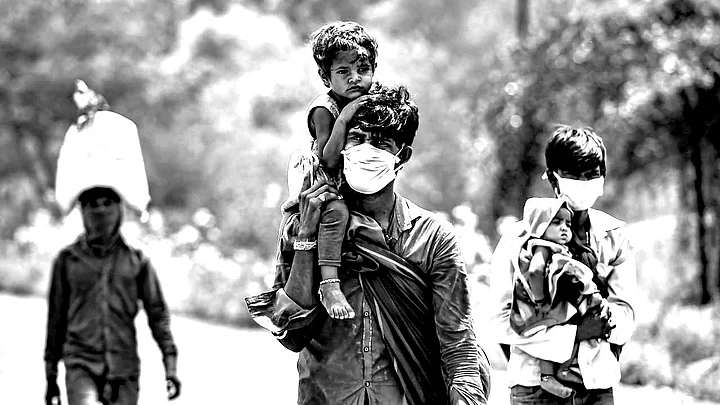The COVID-19 pandemic has further intensified the existing income inequalities between India’s billionaires and its unskilled workers, non-profit group Oxfam said on Monday, 25 June, in a report that will be tabled at the World Economic Forum at Davos, Switzerland.
According to PTI, the Oxfam report said: “India's 100 top billionaires have seen fortunes increase by Rs 12,97,822 crore since March last year, which is enough to give 13.8 crore poorest Indians cheques of Rs 94,045 each.”
The report titled ’The Inequality Virus’ estimated that the wealth of the country’s billionaires has increased by an approximate 35 percent during the lockdown. In the meantime, the report pointed out that 84 percent houses in the country suffered varying degrees of income loss.
‘Would Take an Unskilled Worker 300 Years to Make What Ambani Made in a Sec’
In April 2020 alone, 1.7 lakh people lost their jobs, the Oxfam report said.
Meanwhile, Reliance Industries’ Chairman Mukesh Ambani was announced the fourth richest man on the planet, in August 2020.
Oxfam, in its report said:
“It would take an unskilled worker 10,000 years to make what Ambani made in an hour during the pandemic... and three years to make what Ambani made in a second.”
The report said: "Worldwide, billionaires' wealth increased by a staggering $3.9 trillion between 18 March and 31 December, 2020... at the same time it is estimated that the total number of people living in poverty could have increased by between 200 million and 500 million.”
Oxfam also reportedly said that the increase in the wealth, since the coronavirus crisis began, of the world’s 10 richest billionaires is ‘more than enough to prevent anyone on Earth from falling into poverty because of the virus, and to pay for a COVID-19 vaccine for everyone’.
Suggestions Oxfam made to the Indian government include an immediate revision of minimum wages, and an increase in those at regular intervals.
According to PTI, the report also pointed out India has the world's fourth lowest health budget in terms of its share of government expenditure,
Oxfam also said, in its report, that if the top 11 billionaires of India were taxed at a mere one percent on the increase in their wealth during the pandemic, the outcome could increase allocation to the the Jan Aushadhi scheme by 140 times. The Jan Aushadi provides affordable medicines to the poor and marginalised.
India’s Poor, Who Only Got Poorer
As the coronavirus outbreak resulted in the enforcement of nationwide lockdown, the country saw a huge exodus of migrant labourers who had been working in different states far away from their hometown, just to earn a living.
Many jobs were lost, many struggled to get home, and many lost their lives due to unemployment, poverty and hunger that intensified amid the coronavirus pandemic.
Earlier in 2020, the government drew immense backlash after the Union Ministry of Labour and Employment told Parliament that it has no data available on the number of migrant workers who lost their lives during the nationwide lockdown, imposed in a bid to curb the spread of COVID-19.
WHO Warns of Global ‘Catastrophic Moral Failure' As Developing Economies Lag Behind
In a report published by the World Health Organization on Monday, the organisation noted that advanced economies will face a big blow to their economic recovery due to the pandemic unless they aid developing countries accelerate their vaccination programmes, Financial Times reported.
The director-general of the WHO Tedros Adhanom Ghebreyesus said, “The longer we wait to provide vaccines, tests, and treatments to all countries, the faster the virus will take hold, the potential for more variants will emerge, the greater the chance today’s vaccines could become ineffective, and the harder it will be for all countries to recover.”
As poorer countries lag behind richer societies in their ability to access scientifically-backed vaccines, the WHO also warns of a global “catastrophic moral failure.”
Economically, if the situation in poorer countries remains the same in terms of vaccine development, advanced economies will face output losses of up to $2.4tn, which is 3.5 percent of their annual gross domestic product pre-pandemic, due to the disruption in global trade and supply chains, the report said according to FT.
The Covax facility, set up by the WHO, Gavi and the Coalition for Epidemic Preparedness Innovations for the purpose of providing equitable distribution of COVID-19 vaccines, is struggling to mobilise support from rich nations and faces a $27bn funding shortfall.
Widening Disparities May Hinder Cooperation Needed to Tackle Long-Term Risks: WEF Annual Global Risks Report
In a Global Risks Report released ahead of the WEF’s virtual ‘Davos Agenda’ summit, the WEF termed ‘infectious diseases’ as the biggest risk in terms of impact for the next decade, while ‘extreme weather’ tops the chart for risks in terms of likelihood, PTI reported.
The reported noted that the year 2020 “saw the effects of ignoring preparation and ignoring long-term risks. The COVID-19 pandemic has not only claimed millions of lives, but it also widened long-standing health, economic and digital disparities.”
Groups disadvantaged before the pandemic now at risk of completely missing pathways to the newer, post-recovery societies, the reported said. In terms of technological skills and digital literacy, the gap between the ‘haves’ and the ‘have nots’ is also at risk of broadening and hindering social cohesion.
The report also referred to “increasing tensions between China and India” among one of the most significant geopolitical risks.
“While these potential disparities could cause societal fragmentation for states, an increasingly tense and fragile geopolitical outlook will also hinder the global recovery if mid-sized powers lack a seat at the global table,” PTI quoted the WEF.
As environmental threats dominate in terms of impact amid these developments, achieving the global coordination needed to effectively react to the planet’s degradation might be a bigger challenge that perceived.
(With inputs from PTI)
(At The Quint, we question everything. Play an active role in shaping our journalism by becoming a member today.)
